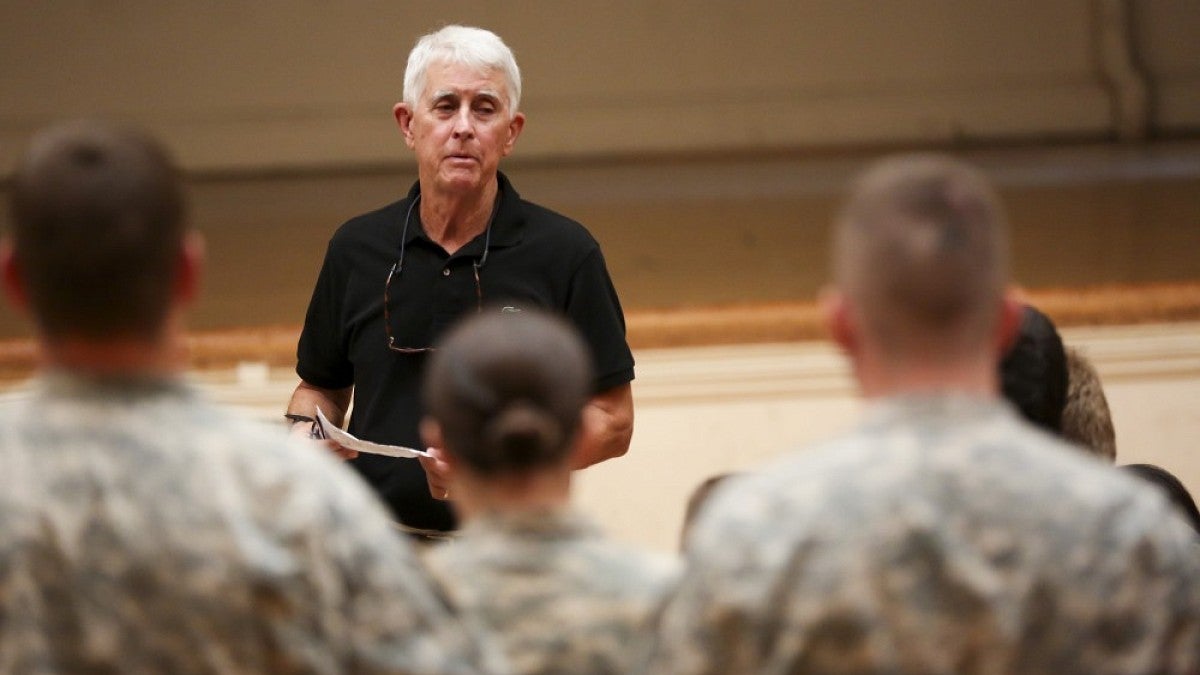You could call Bob Kennedy an old soldier who has no intention of fading away.
Trim and fit at 72, the former ROTC cadet shows remarkably little wear and tear from the 50 years he’s lived since graduating from the UO in 1965 with a degree in history and a commission in the U.S. Army. It showed last week when he challenged a squad of current cadets to give him 20, then got down on the Agate Hall auditorium floor and matched them pushup for pushup.
“One thing about being 72 is that in some ways you think you’re 72 and in some ways you think you’re still 21,” Kennedy said, smiling but not winded. “That’s why I had them drop for 20.”
Kennedy makes a trip to campus every year from his home in Southern California. He does it partly to reconnect with a program that helped shape his entire adult life and partly to award one of the only local, non-Army scholarships offered only to the UO’s ROTC students, the Robert W. Kennedy ROTC Endowed Scholarship.
He was joined this year by three of his 1965 UO and ROTC classmates — Joe Leahy, Kent Williams and Jim Abrams — making it a kind of mini 50th class reunion. The program will mark another anniversary next year, when ROTC celebrates its 100th anniversary since arriving on the UO campus in 1916.
Kennedy spent two years on active duty in the Army during the Vietnam War, three years in the active reserves and another year as an inactive reserve, finishing as a captain. While in the reserves, he also launched a successful career as a management and marketing consultant.
But as he approached retirement, Kennedy got the itch to do something for those who did the most for him.
“I think everybody in their 60s thinks, well, it’s time to give back. The only question is who,” he said. “The one that had the greatest impact on my life was obviously ROTC.”
When Kennedy was a student, there weren’t any dedicated scholarships for ROTC cadets, even though all able-bodied male college students were expected to take part and then make themselves available for the draft. And even with the financial aid now available through the Army, cadets often have unmet needs.
That’s why Kennedy decided to create a scholarship to help a cadet complete a degree, get a commission as an officer and have the kind of life-changing experience he enjoyed. The $1,000 award comes in handy for student soldiers hoping to graduate without debt.
“A little bit of money makes a lot of difference in these kids’ lives,” he said.
The scholarship goes to a cadet who displays outstanding leadership qualities, high moral character, exceptional academic achievement and strong military aptitude. Kennedy said it’s been an honor to return to campus each year to meet the recipient.
“The cadets who have received this are really outstanding,” he said. “It’s been humbling to meet these kids.”
This year that outstanding cadet is Grant Hewitt, a senior economics major who will get his commission this summer. Hewitt comes from an Army family and moved around a lot, but the UO was his top choice when he was applying for college.
He said the money will help, but the real honor is walking in the footsteps of the top cadets who earned the scholarship before him and shaking the hand of the man who made it possible.
“To have it presented by such a distinguished graduate, it’s really an incredible honor,” Hewitt said. “To see these officers who graduated so long ago then come back and say ‘This is my foundation’ is really inspiring.”
Both the campus and Kennedy have been through a lot since his student days. He pursued his history degree before waves of student protest hit universities across the country; Kennedy remembers a campus that “still had a warm glow of patriotism from World War II” and a nation more worried about the possibility of another land war in Europe than one in Southeast Asia.
But the turbulent years that followed are long past, and the UO continues its strong ROTC program, has robust services for returning vets and is one of only 16 Tillman Military Scholar University Partners. And despite all the physical changes in the intervening years, Kennedy said that when he walks across the heart of campus now he still sees the same place he came to love more than 50 years ago.
“I walk through this campus now and it’s like it’s still 1965,” he said.
—By Greg Bolt, Public Affairs Communications


